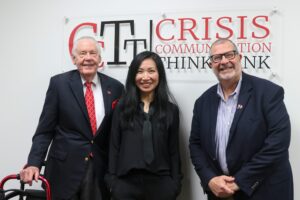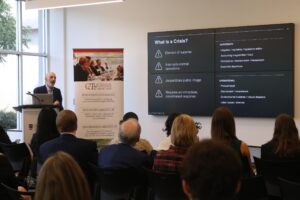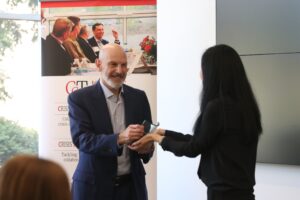Yarbrough Distinguished Lecture Series: Crisis Communications on Wall Street

Yarbrough Distinguished Lecture Series: Crisis Communications on Wall Street
The University of Georgia’s Grady College of Journalism and Mass Communication hosted a visit by Steve Frankel (ABJ ’83) for the inaugural Yarbrough Distinguished Lecture Series on Oct. 19.
Frankel discussed key strategies in crisis communication and shared his wealth of experience in the field. He is currently a senior partner at Joele Frank, a strategic and financial communication firm headquartered in New York City.

Dean Davis introduced this lecture with a tribute to Dick Yarbrough (ABJ ’59), figurehead of the lecture series and mentor to Frankel. Yarbrough helped to create a professorship leading the crisis communication hub for crisis teaching, research and training at Grady College with the intention of making the college and UGA the go-to place for the study of crises. Yarbrough has ultimately built something that will create a lasting legacy at Grady.
In addition to creating a professorship, currently held by Dr. Yan Jin, Yarbrough created the Crisis Communication Think Tank. The CCTT facilitates discussion and research surrounding crisis communication and strategic conflict management amid leading scholars and professionals from around the globe.
Frankel launched this lecture series with his talk titled “Crisis Communications on Wall Street.”
Frankel’s Early Career
Frankel began his career as a sports writer and editor for the Courier Herald. He then went to work as a speechwriter for the Governor’s office where he met Yarbrough and their mentorship formed. Frankel eventually moved to Joele Frank, where he currently serves as a partner who specializes in crisis communication.
Frankel’s exposure to diverse career opportunities offers a unique perspective on serving as the spokesman for large corporations.
“The job you start in is not likely to be the job you finish in, but every job is a learning experience,” said Frankel.
What is Crisis Communication

Frankel categorized crises as situations that have the element of surprise, interrupt normal operations, jeopardize public images and require immediate coordinated responses.
In the current day, social and digital media alter the landscape for crisis communication. This new age of technology changes how crises are reported and how they develop. Public platforms held by companies enable crises to spread rapidly across the internet which create new and evolving challenges for communication practitioners.
Frankel outlined the following effective strategies for handling crisis communication:
- Gather facts quickly
- Never speculate
- Serve as the most credible source of information
- Use accountability as a key measurement
- Send strong, simple messages
- Enlist third-party experts and advocates
Case Study: Sandler O’Neill & Partners
Frankel worked with Sandler O’Neill & Partners, an investment banking firm and broker dealer, after it suffered losses from the Sept. 11 attack in New York City. CBS’s program, 60 Minutes, approached Sandler O’Neill & Partners to produce a segment on the firm post 9/11. Frankel encouraged the firm to accept the segment. In his lecture, he used CBS’s segment to exemplify the importance of effective crisis communication.
Through the segment, Sandler O’Neill & Partners successfully communicated that they were still in business to other Wall Street firms and, more importantly, conveyed the message that Sandler O’Neill & Partners was part of a much bigger story than just its firm. The effective communication strategy situated the firm within the larger events of 9/11 and thus crafted a stronger, more compelling story.
Frankel encouraged students to examine who the key audiences were for this segment: families, employees, competitors and clients. He then highlighted the importance of tailoring messages for individual audiences.
“Employees of companies are sometimes the most critical audience because they’re going to help you communicate to the outside world,” Frankel said.
Tips for a Career in Crisis Communication

Frankel left students with seven key pieces of advice for a successful career in crisis communication:
- Every job is a learning experience
- Read, read, and read some more
- Learn business fundamentals and terminology
- Strong writing and speaking skills will serve you well
- Treat all your colleagues with respect
- Don’t be shy about asking questions
- Find a mentor (and more than one if you can)
“If I can encourage you to do anything, it would be to read as much as you can, particularly if you’re going to go into business PR,” Frankel said.
The lecture concluded with Frankel and Yarbrough answering questions from students. Both emphasized how crucial it is for communication representatives to have a seat at the table with executives, particularly when resolving crisis situations.